AN IMPRESSIONABLE CHILDHOOD
It was an unusually cold winter morning when I came into the world, on the 11th of December, 1922. My arrival was taken naturally, without excitement, because one, it being such a chilly morning, and two, my being the third son in the family. I had companions even as an infant. My elder brothers, Noor Mohammed and Ayub. As years went by our family grew and grew. Those days there was no concept of family planning and our parents were fortunate to make us a family, in all, of thirteen children.
We grew up in a small mohalla - Khodadad - in Peshawar (now in Pakistan). Those were happy days, filled with sounds of laughter unless of course, we had to speak to our grandfather. His word was law in the family and everyone was scared of him except me. I don't know why, but somehow I was a very precocious child. Once, when I was four years old, I made him go down on his haunches, while I rode him like a ghoda. So far so good, but on an impulse, I suddenly grabbed his beard and yanked at it as if it were the reins. My grandmother who entered the room at that precise moment couldn't believe her eyes. She called my grandaunts and the women stood behind the curtains laughing, enjoying the show. It is another matter that I was pulled up and given a thrashing. That day, I learnt that no matter how young, even children cannot be forgiven for indiscipline. There are some boundaries that have to maintained.
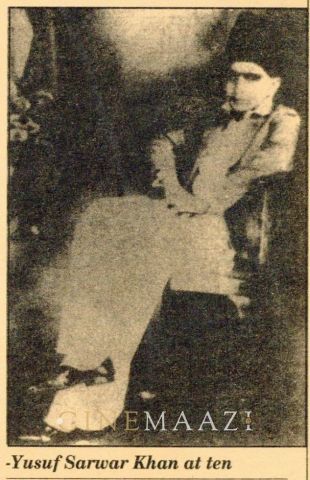
My father maintained them too with his own father, with us kids. He spoilt us thoroughly but was very strict at the same time. You can say we were a very traditional, deeply religious family. Namaaz-e-zohar was a customary ritual everyone in the family observed. Every Friday, abba woke me up early in the morning saying, 'lale, chalna hai na hamare saath?' And I'd get up instantly. It's funny but I looked upon the ritual as an outing. It was the day I looked forward to throughout the week. Being a fat child, I walked very slow and so abba carried me. I'd be comfortably chatting with him, enjoying the ride, oblivious of the discomfort I caused him. I am sure he felt the burden, but he bore it patiently These are warm memories. He talked to me about the future and told me great stories. I enjoyed them. There was always a moral to his story and this calmed me, even if only temporarily.
By temperament, I was a restless child, always doing things I was not supposed to. We had a small pond near our house which was frozen in winter. Once, I tried washing my face with the icy water and returned home crying because my cheeks and lips had cracked and were bleeding. Those days, lifestyle changed according to the seasons. In summers, it was so hot that the women in the house retired to the taikhana, after lunch, for a nap. There were special wooden benches laid out in the middle of the room for us children too and we were forcibly made to sleep in the afternoon so that we would not loiter about in the sun. I hated these afternoon naps. Quietly, I'd wait for everyone to doze off and then sneak out to the garden of a nearby mosque to pluck berries.
One afternoon, as I was plucking berries, I saw two big Pathans fighting. I got so frightened that in my nervousness I dropped all my berries. This caught their attention and they stopped fighting and instead, began firing me for loitering in the sun. When they were not looking, I escaped and ran home, snuggled next to my mother. That was the first time I saw two people really hit each other. It was the first time I had seen blood and I was scared. That bloody sight stayed with me for a long time.
Another violent incident that left a life-long mark on my psyche, occurred in our gully. One ordinary afternoon, we were at home relaxing, when suddenly we heard the screeching of brakes and a lot of commotion. On rushing out, I saw the most horrific sight of my life. Our neighbour's three sons were lying on the road, in a pool of blood. The agony of the dead men's mother cannot be described in words. The police arrived to investigate and soon the entire neighbourhood had gathered.
It was the phase when riots had become a common sight on the streets. And that day was a particularly dangerous day The police started firing shots to disperse the crowd. In confusion, I lay down on the ground, weeping. So, nervous was I, that I just lay there till the chaos subsided. Finally, when I gathered courage and looked up, I realised that I had been lying close to one bloody corpse, that too with my arm around his waist!
The incident traumatised me. For days, after that, a depression set in on me. I could not forget that sight. It took me a very long time to recover from the incident. Even today when people crowd around me, I am reminded of that incident. I feel claustrophobic.
Fortunately, my school was a major distraction during that time. Schools in Peshawar, had just a few teachers and even fewer students, so there was a personal vibing between the guru and the shishya. Not to forget that everyone in the school knew about my father's fruit business. But then it was a small world and everyone knew about everyone's business and personal life.
Abba had a wholesale fruit business and needed to travel outside Peshawar, from time to time. Especially Bombay and Calcutta. Whenever abba returned from Bombay, he came back with lots of gifts for us. So there was always a great fascination for the city in my mind. Little did we know that fate had set our future in Bombay.
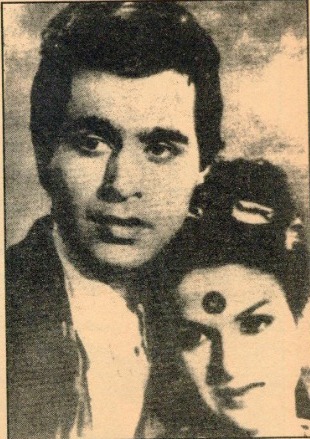
One day, my brother Ayub, while riding, fell off a horse and was seriously injured. Medical examination revealed that his spinal cord was damaged and he was in need of a long treatment in Bombay Now, since abba already had an establishment at Crawford Market, Bombay, he decided to rent a house for us at Nagdevi Street, and move the entire family to Bombay until Ayub was nursed to normalcy again.
The next few years were a continuous flux. We'd wait for the end of the month to go home and the doctors would delay us again. Soon, it was discovered that Bombay's humid climate was hampering Ayub's recovery and the doctor suggested we shift him to Deolali, near Nasik. And so it was Deolali.
I was fourteen years old by then and was admitted in a local school there. But my heart wasn't in books. In the adjoining bungalow lived a sweet, painfully shy, pretty girl whom I would see by the window whenever I went to and came back from school. Kulsoom was her name and she was my first love, even though I never ever mustered up enough courage to go up to her window and say 'hello'.
My romance was short-lived, for with the start of World War II in 1939, the military requisitioned our bungalow and we had to shift back to Bombay. This time though, my father decided that the bungalow and the city were for keeps. We had changed three cities and three homes in the last ten years and it was all terribly unsettling to be on the move. I was admitted in the Anjuman-e-Islam High School. Initially, I felt out of place in the school, but slowly, I made plenty of friends. Mukri was one of them, even though it was his elder brother who was my classmate. Our friendship got further strengthened when we both found ourselves in films.
At that stage though films were the last thing on my mind. I was very keen on becoming a sportsman. Cricket and football were the twin loves of my life. Games somehow have always fascinated me and right from my school days, I was used to being a star sportsman. I was good at card tricks too. My favourite pastime was to gather everyone at home and in the neighbourhood and play cards. Always, I won all the rounds much to the consternation of my brother, Nasir. Once, Nasir got angry with me, because my tricks were so good that his team wanted to desert him and move over to mine.
Incidentally, those days it was Nasir who was the film buff and keen on acting. My only ambition was to learn the ropes of abba's business, earn lots of money and keep the family happy. But since I was still too young, the emphasis was more on completing my studies. After school, I went to Wilson College. Here, I shone in football. Everytime there was an important match, large crowds gathered to cheer me. Taxi drivers of Bombay, in particular, were my fans and would bet with each other on how many goals I'd make. Soon my fame spread and Khalsa College in Matunga (which even today is known for its sports faculty) asked me to join them and I did.
While I was doing my junior BSc, abba asked me to assist him in the fruit business. It was just the opportunity I was waiting for. Though I was enjoying college, I couldn't wait to start earning my own money. It was all very exciting. Initially, I made a lot of mistakes but soon I came to grips with the adhat (commission) business.
Gradually I developed the intuition to discern a good deal from a bad one and slowly abba's confidence in me grew. He began sending me out of town to clinch new deals. I was enjoying the independence. And the confidence, this independence brought me, was terrific. Once, I was sent to Nainital to fix up a deal. And this was a trip that changed the entire course of my life. My boat, which was cruising along smoothly till then, got caught in unexpected currents and turned topsy turvy. In Nainital, I met Devika Rani, the woman who was to give me my big break in life...!
FINDING MY FEET
Devika Rani was a celebrity, everybody knew those days. Apart from being a famous actress, she was also the manager of Bombay Talkies. My meeting with her was quite accidental. It is strange how fate ordains certain things in your life! Devika Rani had come location hunting with her director,Amiya Chakraborty, when I bumped into her. I was shocked that a star of her status should show interest in a rank stranger. She gave me her card and said, "do call on me when you return to Bombay, as I wish to discuss something with you." I knew instinctively that it was to be an offer for a film that she had in mind. Still, when by myself, I refused to take the incident too seriously. Besides, I didn't think I was all that great looking and most importantly, my heart wasn't in films. It was in my business. In making money.
So, on my return to Bombay, I promptly forgot all about Devika Rani's card. In fact, I even clinched a deal with a contractor to start a small canteen in Pune. The first day we made a profit of Rs.42. I was thrilled. It was a very handsome sum in those days. Of course, later as more forty- two's began flooding in, I lost enthusiasm. Slowly, a sense of stagnation began creeping in on me. My business ventures were going fine, my family was happy, yet something was missing somewhere. I was happy but not charged. I realised that the monotonous job of a businessman was not suited to my temperament. One day on an impulse, I decided to take a chance and meet Devika Rani. After all, I was curious about what she had wanted to see me for.
Those days, the Bombay Talkies office was at Malad while we lived in Bandra. At ten-thirty in the morning, the next day, I landed up at the Bombay Talkies office, hoping to catch Devika Rani before she got busy. I had even planned my conversation with her but imagine my shock when I realised it was a Sunday, and the office was closed! I was about to turn right back, frustrated at my own foolishness, when I saw a man sitting outside the office eating a salt sprinkled kairi. I struck up a conversation with him while accepting his offer to the mangoes and confided in him, the purpose of my visit. He heard me in silence, explained that nothing could be done on that day, but maybe I should come again the next morning.
.jpeg/WhatsApp%20Image%202020-08-20%20at%206_21_20%20PM%20(1)__326x480.jpeg)
It was later I learnt that he was S.Guruswamy, production secretary of Bombay Talkies. I felt so foolish wasting a day on the visit, that I had no intentions of returning the following day. In the morning, I was consumed with this urge to go out and try my luck, one last time. This time though, I was sure that if nothing came of it, I would forget all about Devika Rani, films and excitement and concentrate on what I knew best, my business. But that was not to be!
Guruswamy was outside the office this morning too. Within moments, he ushered me into Devika Rani's spacious cabin. My interview with her lasted precisely five minutes during which she asked me four questions. "Have you acted in films before?" my answer, "No, Madam , "Would you like to join films?" My answer, "yes madam, " "Do you smoke?" My answer "No madam," "Can you speak good Urdu?" My answer, "Yes madam."
That was all. Her face was blank when she said she would get in touch with me in a few days time. I left her office, dejected. I thought it was a closed chapter already and tried concentrating on my business. By this time, my canteen in Pune was doing even better and I was wondering if I should open one more canteen in Bombay as well. Caught up in these immediate plans, I was going about my routine, when I received a letter from Bombay Talkies, asking me to go and see Devika Rani. It was a moment of conflict once again. Here was a time I was in a fix. With my business plans expanding, I wasn't sure if I ought to meet Devika Rani for this would upset my current career. After much thought, I did.
Devika Rani looked me over one more time, quietly then without saying a word, handed me a piece of paper It was a contract letter. It said that I would be paid a monthly salary of Rs 500 and a yearly increment of Rs 200 if I did my job satisfactorily. I couldn't believe my eyes. Couldn't believe it was happening to me. After the initial excitement, my first thought was, 'what would my father say?' Coming from an extremely conservative family, he wouldn't be able to take this shock. But since Lala Bashesharnath (Prithviraj Kapoor's father) and my father were very good friends and since both our families came from Peshawar, I thought, he could, be somehow made to get used to it. After all, our association with the Kapoors was old and intimate In fact my father often criticised his friend for letting his children into this profession."Bashesharnath, how can you allow your son to act with the naachnewaalis ?" he always said. So I shuddered to think how he would react when he learnt of his son's association with the film world.
But Devika Rani solved my problem to some extent. She decided that Yusuf Khan was not a suitable film name. So, after some debate, she came up with three alternatives and asked me to select one. Jehangir, Vasudev and Dilip Kumar were the names, she suggested. I was too tense to think and even though I liked the others, I blurted out, "Dilip Kumar". And since nobody knew me by my new name, I could safely deny any association with the actor.
Surprisingly, I didn't feel any remorse closing down the canteen, I had built with so much love. Maybe, I was too excited by my new profession. The shooting of my first film Jwar Bhata (1944) started almost immediately. My heroine was Mridula - also a new girl and there was none of the fanfare that the launch of a new film inspires these days!
The atmosphere on the sets was very strange. Maybe, because I was totally new, I reacted very strongly. Not used to the foul language being mouthed around me, I felt uncomfortable and withdrew. Also, their passion for purposeless talk, especially gossip, would annoy me no end. Every day after lunch, almost like a ritual, the whole unit would gather in a corner for their paan eating gossip sessions. I called it the Paan Club. Since I didn't share their habits. I stayed aloof from them. The unit members mistook this for highhandedness and in due course, I became the object of all their jibes and barbs.
Initially, I just ignored them, thinking they would stop. But when they started getting more and more vicious, one day, I joined them in their session and at the opportune moment let loose such a volley of abuses, only to teach them a lesson. That was the day when all attacks stopped on me. It was the end of their paan sessions too.
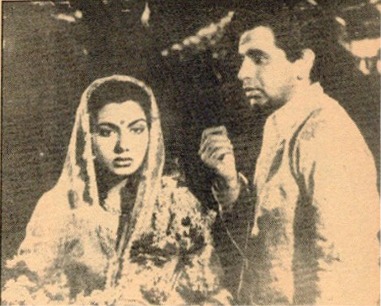
I guess every newcomer has to go through his teething problems. His period of finding his feet in this soil, but when he finds his place in the sun, he's taken seriously by the others. As I was getting used to my film environment, my family at home was getting used to my late hours as well. Everyday I had to make a new excuse for staying out late, but it worked. Even after shooting started, I could not muster up the courage to tell my father about my new profession. I dreaded to even think of the day he would discover. Unable to keep the secret any longer, one day, I confided in my elder brother, Ayub Khan. Ayub was very sympathetic and together we hatched a plan and I informed my father that I had secured a job with Glaxo at a monthly salary of Rs.500.
Abba was thrilled and he had his own reasons for this. World War II had begun and there was a severe shortage of milk and biscuits. Only people who were working in firms like Glaxo, got supplies of these items. So my father made me promise to bring the weekly quota for the house. Once again, I was in a fix. How on earth was I going to manage this request? I didn't know anyone who could arrange this for me. An old Khalsa College friend, Ved Puri, came to my rescue. The poor guy would hunt all over Bombay for the biscuits and every Thursday, we would meet at Bandra station, after which, I would promptly deliver the parcel home. Everyone was happy except poor me, for, every week I was shelling out steep black market rates for the goodies, the family thought came free.
Initially, luck was just not on my side. My first film Jwar Bhata did not do well even though my performance was appreciated. Pratima (1945) was my second release and even that sank without a trace. I was depressed and sitting at home brooding when Lala Bashesharnath dropped in to meet my father with a folded newspaper in his hand. I knew instantly, he meant trouble. My heart sank. Waving the newspaper at my father, Lalaji said, "See, see, your son is also in films now. Check his photo in the paper." My father was livid! He called me at once and asked me to clarify. I saved the situation by denying the whole thing outright and since the picture was very hazy, I got away Although later, when more people came upto him with the picture, he knew there was more to it than met the eye. And finally, I had to confess the truth.
For a long time after that, he did not speak to me. They were terrible days but eventually, like all fathers, he forgave me and I vowed never to keep him in the dark in future. And yet, he had his little reservations... He refused to sit in the new car bought of my film earnings as a sign of protest. I understood his pain and didn't pressurise him. On the career front, things weren't exactly bright, when my third film Milan (1946) flopped too. It was a bad start. All my films were flopping, despite, my best
efforts and I was giving up hope...
Then on Naushadsaab's recommendation, Wadia Movietone signed me for their film, Mela (1948) opposite Nargis. Although I had no hope left, I put my soul into the film for whatever it was worth. The year was 1948, Mela became a roaring commercial hit, followed by Shaheed (1948) with Kamini Kaushal, which became a rage and after that there was no looking back.
RARING TO GO
The tragedian title was bestowed on me after the success of Mehboob Khan's Andaz (1949), starring Raj Kapoor, Nargis and myself. After Andaz, I was flooded with further roles of the jilted lover. Some, I accepted. Others, I refused. People thought I was acting pricey, they complained that I had become too big for my boots already. But the real reason, which I am revealing today, was that I was too lazy. I have this inherent inertia in me. I take a very long time to goad myself into doing things, very long time to make decisions, which people invariably mistake for snobbery. Fortunately, this minus point helped me in the long run. I did a few, but good films. Even today, its a habit with me to procrastinate. I can never bring myself to complete an assignment unless I have a deadline. But once I plunge into it, my heart and soul is in it till the very end.
One thing, I was sure about was not wanting to get typecast. So, from the beginning, I tried to accept a variety of roles. When I felt the sad roles were becoming too many, I deliberately turned my back on tragedy. Azaad (1955) was my first attempt at a happy-go-lucky fellow. It was a very big leap indeed. Those days, my films sold on the basis of whether I died in the end. If I did not, many distributors backed out.
The same happened with Azaad. Later, of course, on release, the distributors returned. Soon, however, all the producers were wanting me to play only happy-go -lucky roles, but I was careful not to cash in on the comic image, as that would be allowing myself to get typecast all over again.
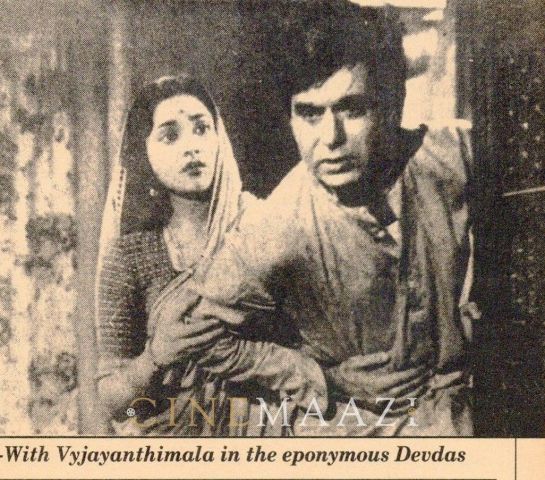
It was around this time that Bimal Roy came to me with the offer of Devdas. It was a story that had been filmed twice. Once with K.L. Saigal and the next time with P.C. Barua. I was not sure if I'd be capable of doing justice to the role. But Bimalda insisted, "I am confident about you," he said. "You interpret the character your way," he assured me. Fortunately, I hadn't seen either of the previous attempts. Neither, P.C. Barua's nor Saigal's Devdas, so I was spared of any preconceived notions. My performance was widely appreciated and I even got the Filmfare award for it. But somehow, even today, I have this feeling of inadequacy... as if I didn't give all that was to be given, to the role.
Bimalda cast me in Madhumati (1958) almost immediately after Devdas. Again, I had reservations about the reincarnation angle in the story, but did not argue with Bimalda, as I respected his uncanny perceptions of audience's taste. Once again, the film was a runaway hit and I received yet another Filmfare award.
Life was going on fine and my films were doing well. Around this time, came K Asif s Mughal-e-Azam (1960). It was a challenge, a milestone in my career to play the historical character of Salim, and more so since everyone had preconceived ideas of the Salim-Anarkali love story.
An actor gets many offers, but it is not possible for him to do all. He sometimes, makes correct decisions and sometimes refuses films that go on to become big hits. These things happen, but they happen to everyone. Guru Dutt's Pyaasa (1957) was one such film. He was very keen that I do the role.
S.Guruswamy, who had then quit Bombay Talkies and started working with him, tried to mediate between us. I had great respect for Guru Dutt, but the script that he showed me at that time had a lot of discrepancies. Also the subject was too desolate and since I had already played the melancholic hero, I didn't feel inspired enough to do it. And most important, I was so busy with my prior commitments, I knew getting into the right frame for the Pyaasa character would take time. Later, when I saw Pyaasa on screen, I loved it immensely, still, I don't regret my decision.
Slowly, I was becoming familiar and comfortable in the film atmosphere and had even made some very close friends. Naushadsaab, who was instrumental in getting me a role in my first hit film, Mela, even today remains a dear friend. And of course, Lata Mangeshkar, who I treat like my younger sister. How I met Lata, the first time is an interesting story by itself! We were both strugglers at that time, new to the industry. One day, while travelling by the local train, I hopped in from Bandra, on my way to Goregaon for the shooting of Shaheed. There, I saw Anil Biswas sitting in the train accompanied by a shy looking girl, her saree pallu tightly wrapped around her. Since I knew Anilda, I went and sat beside him. He introduced me to the girl, "this is Lath Mangeshkar, a new singer... Her voice holds great promise," he said flattering the young girl. I was in a jovial mood and my first reaction was, "You're Marathi, aren't you? Better take care not to allow your dal bhat accent to creep into our Urdu!" I had said this as a joke, but Lata was deeply offended, though she told me this only year later And it was my jibe that goaded her into hiring a special teacher who taught her the nuances of Urdu and helped her master the language. So, looking back, my nasty joke helped a good cause and even if it hurt her temporarily, it did her good in the long run.
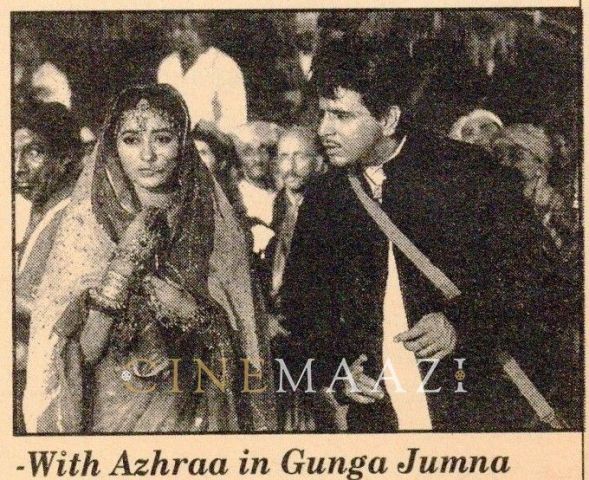
A time soon came, when I began to get bored. I wanted to go beyond acting. I was not yet confident enough to direct my own film. So I decided to start off as a producer. The script of Gunga Jumna (1961) came to me at the right juncture. It was just the subject I was looking for. So excited was I, that I worked on it with a frenzy. Quite uncharacteristic for me, but the effort was worth it. Even today I feel Gunga Jumna is one of my best films. The accent of purbhi which was used in the film was tough and intially I had reservations about Vyjayanthimala being able to get it right. But looking back, I must say she rendered her dialogues brilliantly. She was the ideal choice for Dhanno and no one else would have suited the role so well.
When the film was finally ready for release, we heaved a sigh of relief...But, wait the nightmare wasn't over. There were hundred other problems which finally put me off films forever. No wonder, I didn't attempt it again in all these years. The censors proposed 180 cuts. They were crazy days. That whole year was filled with tensions, fights and friction with the Government. It was the most ridiculous exercise I've ever been involved in. Under the pretext that my film glorified violence, they just refused to give it release orders. All my explanations and pleas fell on deaf ears. It was exasperating! Only after the film was released, and went on to become a big hit, did I breathe freely. After this, I swore never to have anything to do with bureaucracy.
But a certain restlessness wouldn't leave me. I had to do different things to be happy. Explore new avenues, to feel alive. That is why, even though my films like Ram aur Shyam (1967) and Dil Diya Dard Liya (1966) and later Aadmi (1968) were hits, I continuously felt a sort of vacuum in my life. The rot was eating me and I sought advise from my near and dear ones to show me a pathway. They suggested I move towards direction. The idea appealed to me, but I still wasn't sure if I could plunge into it confidently. So, I took the first tentative step. I began by writing my own dialogues for Leader (1964). It was an interesting experiment, though I admit I did make quite a few mistakes. But it was fascinating. I learnt a lot and more importantly, it gave me a lot of confidence.
In Bairaag (1976), I have directed bits and pieces of the film because I was not skilled enough to handle a film completely on my own. Once again, I learnt a lot from the experience but still I was not sure if I could take on an independent film on my shoulder. By now, the feeling of stagnation that I had been sensing for a long time, had become intense. I was fed up with the same old roles in the same monotonous films. I decided I needed a break!
By the time Bairaag was released, I had decided to quit films. My decision sent shock waves throughout the industry. Even Saira repeatedly tried to dissuade me. But I had made up my mind. Once I make up my mind, no one can dissuade me. I may be slow in decision making but once I do, I have an iron will-power I knew in my heart of hearts that once my interest had waned, forcing me to go on acting wouldn't work. Time had come, to make a clean break rather than slide into mediocrity. So I gave up films completely even though I had no goals for the future. I didn't know what I was going to do... How I was going to spend my time... But then, all of life is a gamble, isn’t it?
A NEW DIRECTION
Soon, I realised I had too much time and too little to do. I hadn't bargained for so much free time on my hands. Initially, I didn't know what to do... of course, I missed acting. I would be lying if I said I didn't miss my work but because I soon slipped into social work, it wasn't so bad. I did a stint as the President of the National Association for the Blind, and looking back I must say it was a very satisfying period of my life. I have always believed that people as fortunate as us, should do something for the less blessed as there is so much misery in the world. It is impossible to eradicate misery completely, but if we can do even a little to lessen it, the world becomes a lot more worthwhile place to live in. It was while working with them that I realised how perceptive the blinds are. So many amongst them had been my fans for years, even though they had never seen my face. But they recognised me through my voice... Their love was so moving. It made me realise that an actor can make an impact on so many lives through his films. That films, filmstars are important people because they contribute so much to society. There was so much I wanted to do for them, but the lack of adequate funds and effective infrastructure in the country, left many tasks undone. Still, whenever I can, in whatever capacity, I take an active interest in the activities of the NAB.
Even social work, however, after a while didn't hold my attention for long. I missed my acting. By then, people around me had started telling me about how I had not exploited my talent to its full potential and maybe now that I was not in the rat race, I could return to fulfil the mission left incomplete. I felt scared. Time had changed, the faces and names in the industry values had changed and I wasn't sure if I would fit into the new scheme of things. I was mentally weighing the pros and cons, when Manoj Kumar came to me with the offer of Kranti (1981).
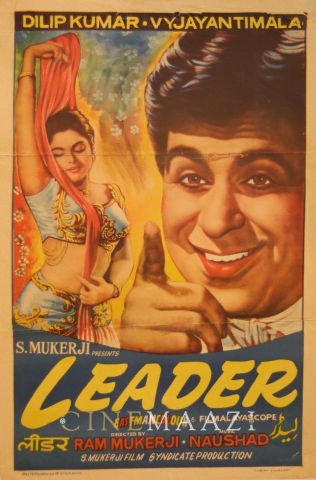
My association with Manoj Kumar went back to the days when we acted together in Aadmi. Those days, A. Bhimsingh, the director, used to keep ill-health. So, with his permission, I directed a few scenes in the film. On those occasions Manoj Kumar used to assist me and had on a couple of occasions showed flashes of brilliance. I had told him early in his career that he would one day make a good director and my hunch was correct. Both, in terms of subject and treatment, Kranti was different. And I have never regretted using it as my come back vehicle.
A lot has been written over the years about my interference with my director's work and my high-handedness while working. I do not deny that I am an active participant in the making of a film. I feel interested in, I like giving my views. If I feel something does not quite fit into the tempo of the scene or my character, in particular, I do bring it to the notice of my director, discuss it with him, but I certainly don't impose. There have been many instances when my suggestions have been overruled and on such occasions, I respect the final word of my director. After all, he is the captain of the ship.
In my second round, I had made certain conscious decisions -- some right, some wrong. Selectiveness has been my hallmark from the beginning and it is this characteristic that has enabled me to survive for so long. They criticise me for doing a film like Dharm Adhikari (1986). But my explanation is that today you cannot choose between good and bad films. You have to choose between bad and horrible films. So, do you blame me if I chose the bad ones? Besides, it's exasperating dealing with the new breed of directors. Many of them are so impatient. It isn't like the good old days anymore,
when each film was worked on patiently Today everybody is in a tearing hurry to release the film, even before it has started.
Ramesh Sippy's Shakti (1982) had a different story. It brought me yet another Filmfare award and this after a gap of 15 years. I was working with Amitabh for the first time and although the role didn't offer him the scope his talent deserves, he did a marvellous job of it. He is a very talented actor. Another person with whom I enjoy working is Subhash Ghai. This maker has understood the pulse of the audience, which is by far the most important quality as a filmmaker. If you know what your viewers want, you can avoid making a flop. I predict that Subhash Ghai, in years to come, will be remembered as the greatest directors of his time.
Every generation calls for its breed of geniuses. I cannot say that the new style of functioning suits my temperament. In these days of junk food and instant coffee, our films are like fast food too. This breakneck pace is taking us nowhere. There is no time to concentrate, no atmosphere to imbibe, absorb and deliver. The rat race was beginning to tell on my performances. Which is when I decided to give up again. But Saira suggested an alternative. She said, why don't you fulfil your life long ambition to become a director? I agreed with her. The time was ripe to plunge into direction.
Once again things fell into place quite by chance. During the making of Izzatdaar (1990), Sudhakar Bokade told me that he wanted me to direct a film, of my choice. I was still dithering, wondering if I was prepared to go in for a full-length feature film. But both Saira and Bokade egged me on and I thought why not give it a serious thought. By the time Izzatdaar completed 100 days, I already had a plot in my mind. It took me six months to work out my final script and finally I was ready.
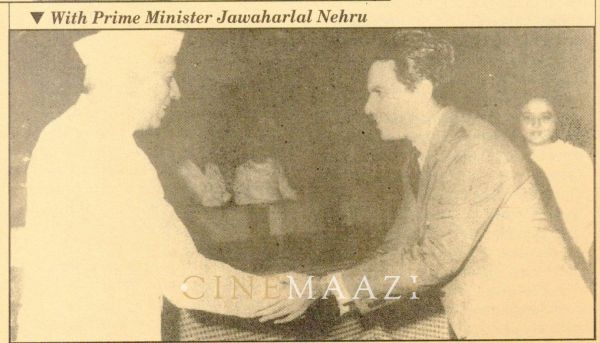
Today all my energies are diverted towards Kalinga. It is my dream to see it on celluloid. All possible care is being taken to see that it lives upto my expectations. In these days of violence, I'm making a film that will spread the message of peace.
Whether I will continue as a director or not, depends on the fate of Kalinga. Whether it is a hit or flop, for me it will be a rewarding experience. Of that I am certain. After a point in life, you are not bothered unduly about success or failure. They are both parts of the growing up process, and that is what keeps one alive. You have to keep growing. Stagnation means death. Each experience adds to your growth and the more you grow, the more you live. I am still living and learning...
LIVING WITH THE LEGEND -SAIRA BANU
(This section is shared by his wife Saira Banu)
Speaking about Yusufsaab is always a difficult task. I often tell him that he is like the Kohinoor diamond. There are so many facets, each one finely chiselled, which trait to talk about and which to ignore. He is, by far, the most versatile actor India has ever produced. As a human being too, I have always felt he can be various people at various times, in various circumstances. Confusing, but that's how I interpret him.
Lazy and lethargic by nature, his indifference to his work at times drives me round the bend. If he has his way he would go on postponing his work perpetually. At the same time, his single minded devotion to a task he takes up, is miraculous. He could go on writing, re-writing and working on his script for hours together, unaware of my existence, or anyone's else's, for that matter. It is during these phases that his volatile Pathan temper is at its peak. A slight rustle of the newspaper is enough to drive him mad! And at such times, it's best to leave him alone.
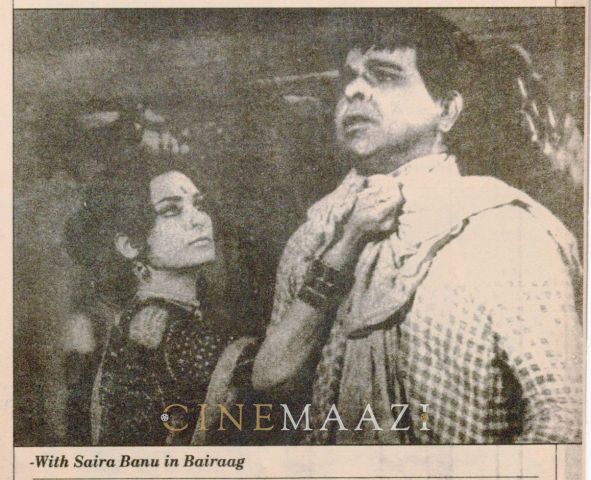
I still remember the time he was working on a script with Kashmir as the backdrop, a project which he ultimately shelved because of his disastrous experience with the Censor Board during Gunga Jumna. So depressed and bitter was he, that he almost contemplated retirement. I had to constantly coax him and cajole him, not to give up so easily... He went through a similar depression during the shooting of Bairaag. Talking of Bairaag reminds me of a particular incident. We were shooting a scene, outdoors at Manali, where I played a village girl. I had to walk past him, towards a pot of water, talking. I had to deliver my dialogues while in the process of washing my feet. I rehearsed the scene in front of him, but he wasn't happy. Then he enacted the scene for me, asked me to watch him do it. The difference between the two projections were unbelievable. And mind you, he was doing it clad in a dhoti and a shirt, but his mannerisms and imitation of a village belle were so perfect that for that one particular moment, he didn't look like a man, but a woman. He enacts every scene for his artiste, and will do so as many times as they want to. He is very patient with the unit, except with me. I am taken to task for the slightest error.
Much has been said and written about how we met and got married. Newspapers, magazines filled and refilled their pages. Besides, now I am too old to be talking about my courting days. But one thing is certain, even though it is so many years, even now I believe in the adage that, "marriages are made in heaven." It is truly a very unique experience of being married to someone like Yusufsaab.
Initially, though, I must admit, I was too much in awe of him. I could not understand how he could be so intense. But as I spent more time with him, I learnt to know him and consequently cope with his sporadic mood changes. Yet, sometimes even today I find it quite unnerving to cope with him. In his humorous moments, he can be equally exasperating too. Recently, he decided one day that he would help me in my housework. Cockroaches had become a menace in the house. So, Yusufsaab took it upon himself to kill them all with his spray-gun. God! he drove everyone mad that morning, when with the spray-gun in his hand, he kept following the fleeting cockroach... under the bed.. over the table... on the wall. Falling all over himself. I was hysterical with laughter watching him in that state...
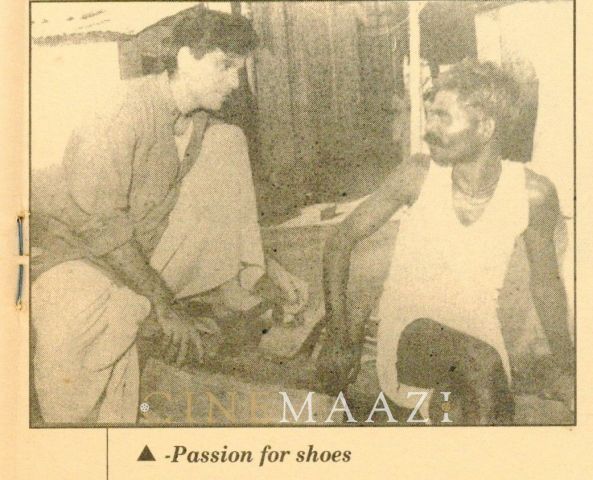
The only other occasion when he looks madly obsessed is when he is cleaning his shoe rack. Yusufsaab has a passion for shoes. He has the most beautiful and exclusive collection of footwear, hoarded carefully. Collected over the years from his various trips abroad, he lavishes special attention on them. At the slightest opportunity, he pulls them out and cleans and polishes them with great pride. He throws a fit when even one of this prized collection is slightly damaged. Another of his passion is wearing immaculately laundered and pressed clothes. He has a resident dhobi for this purpose, who is a star of sorts at home, for I am not allowed to assign this dhobi with any other chore except laundering the master's clothes.
Very few are aware that he is gifted with a very melodious voice. But this facet of his comes to the fore only when he is in the company of his near and dear ones. His knowledge of music, is impressive. He can, for hours, discuss the nuances of a raga. I still remember those days, when my grandmother Shamshad Begum visited us and the two would sit together for hours at a stretch singing alternate lines... It's a pity he didn't develop this talent. If he had, it would have been his companion in old age. Probably he didn't because he finds greater relief in pursuing less taxing pursuits. Like cooking, for instance. He is such a good cook, especially chicken. We always end up licking our fingers after the delicious meal cooked by him. However, the entire process of Yusufsaab cooking is so exhausting... that all work comes to a standstill. When the master enters the kitchen, all servants, maids, even the chauffeur is assigned some task of cutting and chopping. And it has to be done the way Yusufsaab wants, for he will stand on your head like a surgeon supervising an operation. Granted that he comes out with a brilliant preparation, but the sight of the kitchen after this laborious exercise, resembles a battlefield and it takes the servants one whole day to clean and scrub the place.
.jpg/1%20(1)__348x480.jpg)
When he is not cooking, he is nosing around about the menu. He is at his attentive best when we have guests for dinner. Then, he will rearrange the furniture, reshuffle the seating arrangements, in short make life miserable. Nobody knows this but he is a very good mimic. These days, he doesn't mimic very often, but whenever he gets into the mood of mimicking his friends, costars and acquaintances at a family gathering, he is hilarious. As I said earlier, he is a man of many moods. At times extremely philosophical and at times plain lazy.
My best time with him, however, is when he is very romantic. We go on long drives and vacations to green valleys and snow-capped peaks. He likes to stock the car with lots of good food and recites Urdu couplets... It is disgusting, I know, but he makes me feel like a newly-wed bride all over again. "Time stands still now," he would say suddenly "Don't move, for an eternity is condensed in this one moment." Crazy things like that but amiable.
When he decides to, he is so self-assertive that he never listens to anything. He switches off halfway during my conversation and comes out with completely irrelevant observations. It can be frustrating, really. Then again, his habit of buying birthday gifts and anniversary presents and giving them to me on the wrong dates. He has now, for years, been giving me a birthday card on the wrong date. Over the years, I have learnt to accept the gift quietly, without protesting. But soon he discovers his mistake and feels foolish... There are many more foolish things he says and does, but I can't tell you all. All I can say is that I'm fortunate to have married him. For as he says, "Growth is a sign of life. Anyone who stops growing dies." And one thing is certain, as long as I am with him, I will never stop growing.
This article is reproduced from Junior G- the SME of the magazine (issue: September 1991).



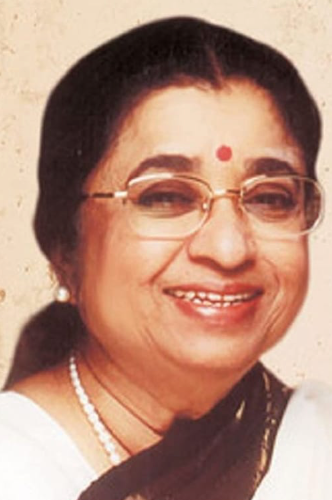
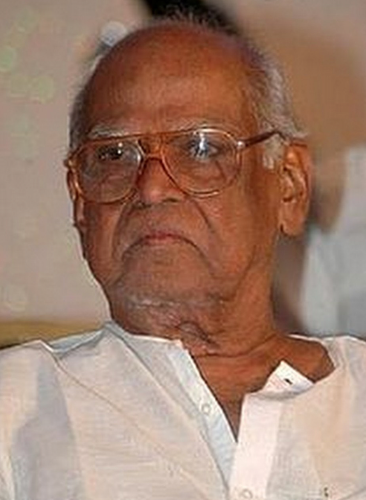
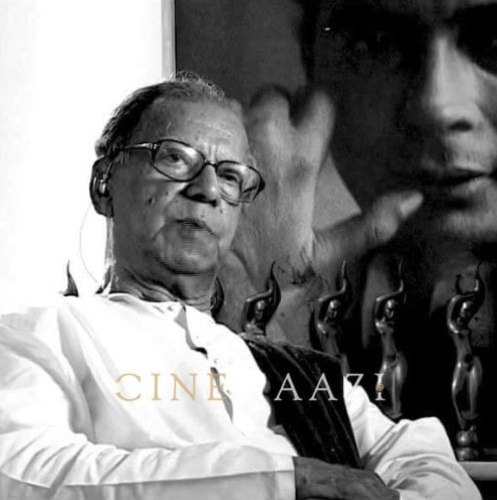

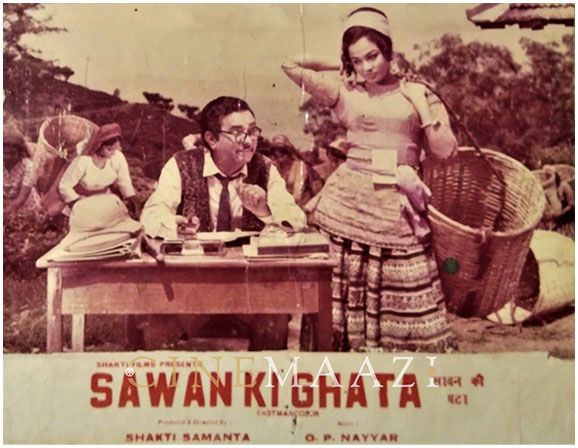
.jpg)


